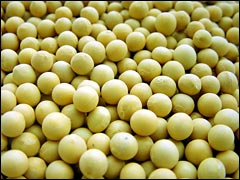GMOs
-
A guest blog from farmer’s rights legend Hope Shand
In the global fight to preserve what’s left of agricultural biodiversity from the ravages of the multinational chemical/seed giants and their government lackeys, no civil-society organization stands taller than the ETC Group. Among other projects, ETC documents the growing dominance over the global seed market by a handful of firms: Monsanto, Syngenta, and Dupont. The […]
-
The sorcerer’s apprentice running amok in ag?
Gene tampering (called "genetic modification" by the same people who call gambling "gaming" and sewer sludge "biosolids") is a terrible idea, said the "extreme environmentalists" who warned that, nature being what it is, it wouldn't be long before we would see invasive weed species adopting whatever characteristics we created.
-
-
But the Franken-mozzies will still bite … and their eyes glow red in the dark!
Genetically-engineered mosquitoes that cannot transmit malaria could help stop the spread of the illness, according to a report in the The Guardian and other publications.
-
Is Monsanto playing fast and loose with Roundup Ready Soybeans in Argentina?
Crying not for Argentina but for lost patent fees, Monsanto’s legal hacks are in European courts suing to block millions of tons of Argentine soybean meal from docking on the continent. Bean there, sprayed that. Photo: iStockphoto Monsanto says that much of the meal crossing the Atlantic to feed Europe’s cows and pigs contains traces […]
-
Umbra on canola oil
Dear Umbra, I recently saw “organic canola oil” on a salad dressing bottle. I looked up the origin of canola oil, and it looks like it is a genetic modification of rapeseed. I thought organic certification disallowed genetically modified foods. What’s the scoop? Tom Grundy Nevada City, Calif. Dearest Tom, Have you noticed yet that […]
-
Biotech crops have benefited shareholders in seed giants, but nobody else
A couple of days ago, NY Times writer Andrew Pollack attempted to address the failure of biotech companies to "improve" fruits and vegetable crops -- that is, to bring a genetically altered fruit or vegetable strain (as opposed to grains like corn and legumes like soy) from seed to supermarket.
Unwittingly, the article illustrates the industry's hubris and the mainstream press's gullibility in covering the topic.
Pollack opens thusly:
-
GM seed manufacturers create conditions that will force their acceptance
This post first appeared on Bitter Greens Journal.
Maverick Farms, where I work, lies on a dirt road halfway up a steep hollow in the Blue Ridge Mountains. Twenty years ago all the land around here was agricultural. Each family generally had a couple of milk cows, a pig or two, and a garden plot to feed themselves; for cash, they planted cabbage (to be sold to a nearby sauerkraut factory, long gone) and tobacco.
All of that has changed. The word "farm" has become a marketing tool to move real estate, and little else. The only other entity with "farm" attached to its name on our road is "Clark's Creek Farm" -- a suburban-style subdivision.
Our area is a magnet for SUV-driving second-home seekers and the real-estate flacks who serve them. Up the road from us, the dirt flies as machines rip into the mountainside to create new lots for fancy homes. Starting at about 7:00 a.m., the rooster's hoarse cry is drowned out by the steady roar of giant trucks careening up the mountain, carrying construction material and machinery.
Nearly everyone up there wants the road to be paved -- it would make construction so much easier, and you could comfortably drive your SUV faster than 20 mph to get up and down the mountain. We say: Hell, no. We're joined in our refusal by two neighbors, people with deep family roots in the area who don't want to see our holler turned into a suburb of Orlando or Charlotte. We refuse to sign the papers that would force the road's paving.
In the end, we will lose and the developers and second-homers will win. They will have forcibly created the logic that makes the road's paving "necessary." Carve enough mini-mansions into the mountainside, cram the road with enough construction trucks and "utility" vehicles, and of course it will have to be paved. It will become a safety issue. The road as it is will have to be condemned; a handsome strip of asphalt will rise up in its place. Progress! And goodbye to our chicken shed and springhouse.
I tell this bitter story to illustrate what's going on with genetically modified (GM) food in Europe. Bear with me.
-
The WSJ documents GM contamination
The Wall Street Journal came out with a terrific page-one article documenting "genetic pollution" -- the damage caused when genetically modified crops cross-pollinate with conventional crops.
The article leads with an organic farmer in Spain whose sells his red field corn at a premium to nearby chicken farmers, who prize the product because it "it gives their meat and eggs a rosy color." (I'd be willing to bet that rosy color also translates to higher nutrition content.)
Now the farmer is screwed -- his seeds, carefully bred over time, have become contaminated by GM corn from nearby farms. The rich red color of his corn, like his premium, has vanished into the ether.
